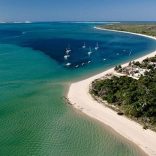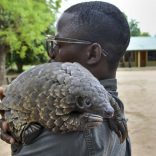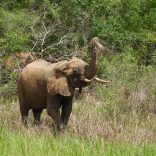Mozambique: Population growth in Bazaruto Park worries authorities
The killing of a ranger protecting rhinos, Mozambican Anton Mzimba, raises fears for conservation efforts

Image: US News
Anton Mzimba, the chief ranger at a reserve in South Africa, had received several death threats. But he tried not to get caught up in the danger warnings and recalled working to protect rhinos for the greater good, according to an interview he gave last year.
“What I do, I don’t do for my own sake,” Mr Mzimba said in the 2021 interview. “I’m doing this for the world, for my children’s children, so that one day when I hang up my boots — when I’m in retire when I die – will enjoy the wildlife.”
Africa’s close-knit conservation community has reeled since Mr Mzimba was gunned down in front of his family on July 26 at their home. His wife was also shot but survived. The killing has fueled concerns that criminal syndicates could become bolder and more violent in their efforts to secure illegal wildlife products.
Mr Mzimba, 42, was the senior ranger at the Timbavati Private Nature Reserve, a 206-square-mile reserve in the Greater Kruger Countryside, home to elephant, rhino, lion, leopard and cheetah. In an environment plagued by poaching and corruption, Mr. Mzimba was known for being incorruptible – a staunch conservationist.
“If you want to speak on the front lines, speak to Anton Mzimba,” said Ruben de Kock, operations manager of LEAD Ranger, a professional training group. “He was the ultimate ranger.”
Available by phone, Brig. Gen. Selvy Mohlala, a spokesman for the police unit leading the investigation into Mr Mzimba’s murder, said that “we do not know if the attack had anything to do with his work or personal life.”
But given the number of serious job-related threats against Mr Mzimba and his efforts to thwart crime syndicates, Andrew Campbell, executive director of the Game Rangers’ Association of Africa, said that seems the most likely motive.
Mr. Mzimba’s commitment to wildlife conservation “definitely” appears to have been a factor, said Edwin Pierce, the Timbavati warden. “Anton was a man of integrity, a man who did not deviate from protecting the rhinos,” he said.
“That syndicates actually did this means Anton posed a significant threat to them,” added Mr. Pierce.
Rangers around the world risk their lives every day, but those in Africa are particularly at risk. Elephant and rhino poachers are always armed, and clashes between militias and rangers are common in politically unstable areas like the Democratic Republic of the Congo.
Of the 565 African rangers known to have died in the line of duty since 2011, Mr Campbell said 52 percent of the deaths were homicides. The number of deaths has also risen, he said, with a record high of 92 rangers last year, half of which were due to homicide.
However, Mr Mzimba’s death stands out as “an escalation from the norm,” said Mr Campbell. “Now these syndicates are comfortable literally coming in and making mob-style hits.”
It’s also likely, added Mr Campbell, that Mr Mzimba was targeted because of his high profile in the conservation and wildlife community. He was named Field Ranger of the Year and is the protagonist of the upcoming documentary Rhino Man. He also served as a technical advisor with the Global Conservation Corps, where he helped initiate a program that now connects 10,000 South African students weekly with their natural heritage.
“Anton was one of the kindest, gentlest, most loving people, but he was also a warrior,” said John Jurko II, co-director of Rhino Man. “He was out there defending these rhinos from serious threats from poachers.”
Born in Mozambique, Mr Mzimba moved to South Africa with his family in search of better opportunities. His career in conservation began rather accidentally when a job removing invasive plants took him to Timbavati. Mr. Mzimba was only 17, but his work ethic caught the eye of the reserve’s director, who offered him a full-time position.
I’m deeply saddened to learn of the killing of Anton Mzimba who I spoke to in November. Committed and brave, rangers like Anton are central to the conservation of Africa’s fantastic wildlife. Those responsible must swiftly be brought to justice. My thoughts are with his family. W
— The Duke and Duchess of Cambridge (@KensingtonRoyal) July 27, 2022
Within a decade, Mr. Mzimba became Chief of the Ranger Corps in Timbavati. “This was a person who really made it from the bottom up,” said Mr. de Kock.
Mr Mzimba often said he considered protecting wildlife to be his duty as a Christian and he was also known for his loyalty.
When Mr Mzimba started work in Timbavati in 1998, the poachers he arrested were mostly poor men who snuck into the reserve to hunt animals for food. However, in the 2010s, organized crime syndicates aggressively pursued rhino horns, which were in high demand in China, Vietnam, and other Asian countries. “We went from poaching and killing animals for a living to killing animals for money,” Mr Mzimba said last year.
According to the International Union for Conservation of Nature, South Africa was home to 75 percent of the world’s remaining 23,562 white and black rhinos in 2017. At least 9,353 of South Africa’s rhinos have been killed for their horns in the past 13 years. Although poaching has declined from a peak of 1,215 rhino lost in 2014, it remains a major problem: 451 rhinos were killed last year.
“I would say we hold the fort,” said Elise Serfontein, the founding director of StopRhinoPoaching.com, a South Africa-based non-profit conservation organization. “But the effort to hold that line comes at a tremendous cost financially, and at a tremendous physical and mental cost for the rangers and reserve management.”
Rangers regularly receive death threats for their work, Mr Pierce said, and Mr Mzimba was no exception. “The poaching syndicates were trying to break him emotionally and psychologically and he wouldn’t break,” Mr de Kock said.
Last spring, Mr Mzimba opened an intimidation list with local police to report multiple threats related to his wildlife conservation work. “We had hoped that those who threatened Anton’s life would be arrested and charged with conspiracy to murder,” Mr. Pierce said.
According to Mr Pierce and Mr de Kock, Mr Mzimba learned in May that his name was on a more serious hit list at the time. Mr de Kock and his wife offered to let Mr Mzimba and his family live temporarily at their home in another part of the country, but Mr Mzimba declined, telling Mr de Kock he needed to stay close to his fellow rangers.
According to Brigadier Mohlala, the police spokesman, two people came to Mr Mzimba’s home on July 26, claiming their vehicle was broken and asking for water. Mr Mzimba was working outside on his car and when his son went to get water they shot Mr Mzimba. They also shot his wife, who is still in the hospital.
No arrests have been made, Brigadier Mohlala said, “but it’s safe to say we haven’t dropped the investigation.”
Mr Mzimba is not the first high-profile conservationist to be killed in what appears to be a targeted assassination. In 2017, for example, Wayne Lotter, co-director of the PAMS Foundation, an anti-poaching group in Tanzania that had been investigating the ivory trade, was shot and killed in a car on his way home from Dar es Salaam airport. “When we lost Wayne, it was definitely a huge eye-opener for us to see just how far people would go if you got in their way,” said Krissie Clark, founding director of PAMS.
In 2020, Lt. Col. Leroy Bruwer, a South African police detective specializing in investigating rhino poaching syndicates, was also fatally shot while driving to work. Last year, Bajila Obed Kofa, a senior Kenya Wildlife Service official, was shot dead while driving home after taking his daughter to school.
South Africa in particular is already suffering from “enormously high homicide rates linked to politics and organized crime,” said Julian Rademeyer, director for East and South Africa at the Global Initiative Against Transnational Organized Crime. Now there are fears such targeted killings could also become the norm for those working in conservation.
If Mr Mzimba’s killers are not brought to justice, Mr Rademeyer added, it will have a chilling effect on other rangers and “send a message that things like this go unpunished and the people involved are virtually untouchable.”
According to the Institute for Security Studies, only 19 percent of murder cases in South Africa are solved. Mr Pierce said he and his colleagues have been “frustrated” so far with what they see as a lack of urgency and “slowness” in the investigation. “Anton’s legacy needs to be honored and we need to get to the bottom of it,” said Mr. Pierce. “We hope this will be considered a high priority case.”
“All murder cases will be treated as high priority crimes,” said Brigadier Mohlala. “As soon as we get something, we will definitely arrest quickly.”
By Henry Simpson
Rangers like Anton are on the frontline of conservation, protecting people as well as wildlife. Among many roles, they are teachers, carers and researchers, looking out for a natural world that can’t defend itself. pic.twitter.com/U48JFhfJPd
— The Duke and Duchess of Cambridge (@KensingtonRoyal) August 5, 2022













Leave a Reply
Be the First to Comment!
You must be logged in to post a comment.
You must be logged in to post a comment.